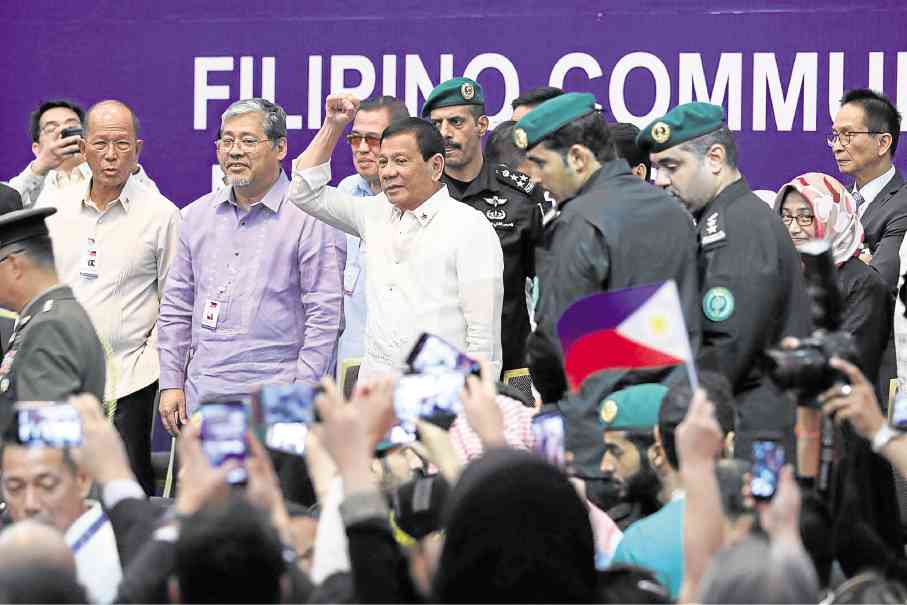
PRESIDENTIAL TRADEMARK President Duterte raises his fist as he acknowledges the cheers of the Filipino community during a meeting at the Marriot Hotel in Riyadh, Saudi Arabia, on Wednesday. —MALACAÑANG PHOTO
DOHA, Qatar —President Rodrigo Duterte flew to Qatar on Friday (Saturday in Manila) where he was expected to meet with Qatari Emir Sheikh Tamim bin Hamad al-Thani and sign three agreements seen to boost cooperation on health, culture and education, among others.
Qatari officials, led by Energy Minister Mohammed bin Saleh al-Sada, gave President Duterte a royal welcome after he arrived at Doha International Airport from Bahrain.
He is the first Philippine leader to have visited Qatar since then President Gloria Macapagal-Arroyo in 2008.
Al-Sada said Qatar was “deeply honored” to host Mr. Duterte, stressing that Filipinos have been instrumental in the state’s progress.
The President was scheduled to meet with some 6,000 Filipino workers here around 6 p.m. on Saturday (11 p.m. Saturday in Manila) after attending the Philippine-Qatar Business Forum.
On Sunday, he was to meet with Qatar Emir Al-Thani at the Emiri Diwan (Palace) “on bilateral relations and means of boosting them in various fields.”
President Duterte and the Qatari emir were expected to witness the signing on Sunday of agreements aimed at improving collaboration in areas of health, culture, and technical vocational education and training.
The agreements on healthcare and training would focus on exchanges of expertise of specialists, research trainers and doctors from both countries.
On culture, a proposed Qatar-Philippine exhibit day was expected this year.
Fifa
Manila’s envoy to Qatar, Alan Timbayan, said he expected more Filipino skilled workers to be recruited for various jobs here as Qatar embarks on a massive construction activity in the runup to the holding of the Fédération Internationale de Football Association (Fifa) World Cup here. Qatar will host Fifa 2022.
Timbayan said the demand for Filipino engineers and laborers was expected to grow as “a result of Qatar’s thrust to develop its infrastructure sector.”
There are currently 222,721 Filipinos living and working in Doha, Timbayan said, but that figure was likely to increase.
Qatari Energy Minister Al-Sada had earlier said Qatar preferred Filipino workers over other nationals because they were hardworking.
Timbayan said officials were also working on a possible waiver on visa for diplomatic passport holders.
He said they were also “looking forward to the signing of bilateral agreement on the promotion and protection of investments during the President’s visit.”
Timbayan said Qatari businessmen “see the Philippines as one of the best locations for their investment.”
OFW protection
Labor Secretary Silvestre Bello III was also expected to meet with his Qatari counterpart, Isa Saad al-Jafali al-Nuami, as Manila pushes for more protection for overseas Filipino workers (OFWs) here, Timbayan said.
Bello will likely raise issues such as maltreatment, delayed or nonpayment of salaries and contract violation, he said.
Timbayan said there were also the issues on nonissuance of residence ID or Iqama, confiscation of passports and contract violation or substitution.
Loida Singh, a leader of an OFW group here, said they wanted to draw the president’s attention to the lack of lawyers to defend Filipinos that had been falsely accused by their Qatari employers.
Timbayan admitted that some Filipinos in jail claimed they were falsely accused with crimes such as immorality because they ran away from their employers.
Populist agenda
These immigrants have been drawn to the region by a combination of factors, including drug crime and corruption back home, and the job opportunities and wages on offer in the Gulf.
President Duterte’s deadly war on drugs may have brought him notoriety in the West, but it has earned him the admiration of many Filipino expatriates anxious for change at home.
“I would happily say I’m a ‘DDS’, a Duterte Diehard Supporter,” Harry Ramos, a senior mechanical engineer based in Doha for 12 years, told Agence France-Presse (AFP).
“His platform of government is simple, and he’s got the political will to do it,” he said.
Duterte’s populist agenda is welcomed well by the Filipino diaspora in Qatar, where he received almost 80 percent of the expatriate votes cast in last year’s presidential election.
Ramos, 58, speaks happily about how Filipinos returning home no longer have to bribe officials to get through customs.
Life though has turned sour for some in the Gulf, especially in Saudi Arabia where 760,000 Filipinos live, and they will be looking to the President to defend their interests in his talks with the region’s leaders.
A collapse in oil revenues since 2014 has prompted subsidy cuts and delays in major projects. More than 5,000 Filipino workers were repatriated from Saudi Arabia last year and most are still waiting to be paid.
Prior to landing in Doha, President Duterte held talks with Saudi King Salman on Tuesday. He was in Bahrain for talks on Thursday.
In the bustling Souq Waqif area of the Qatari capital Doha, Filipinos were excited about their maverick leader’s trip.
On a balmy early summer evening, conversation outside the busy Manila Supermarket quickly turns to the President’s visit.
Ray, a 38-year-old civil engineer, said he wanted to meet President Duterte, something he could never achieve back home.
He admitted there was an issue with the poor treatment of some migrants, especially those in domestic service, but said life was generally good for Filipinos in the emirate.
“All Filipinos come here because they want to earn money,” said Ray, who has been here for six years. “But, if they had to choose the place they will live, of course they will live in the Philippines, they will choose it. Definitely.” —WITH A REPORT FROM AFP
RELATED VIDEO
[ventuno id=’OTIxNzA4fHwyMzY4fHwxMDg2fHwxLDIsMQ==’][/ventuno]